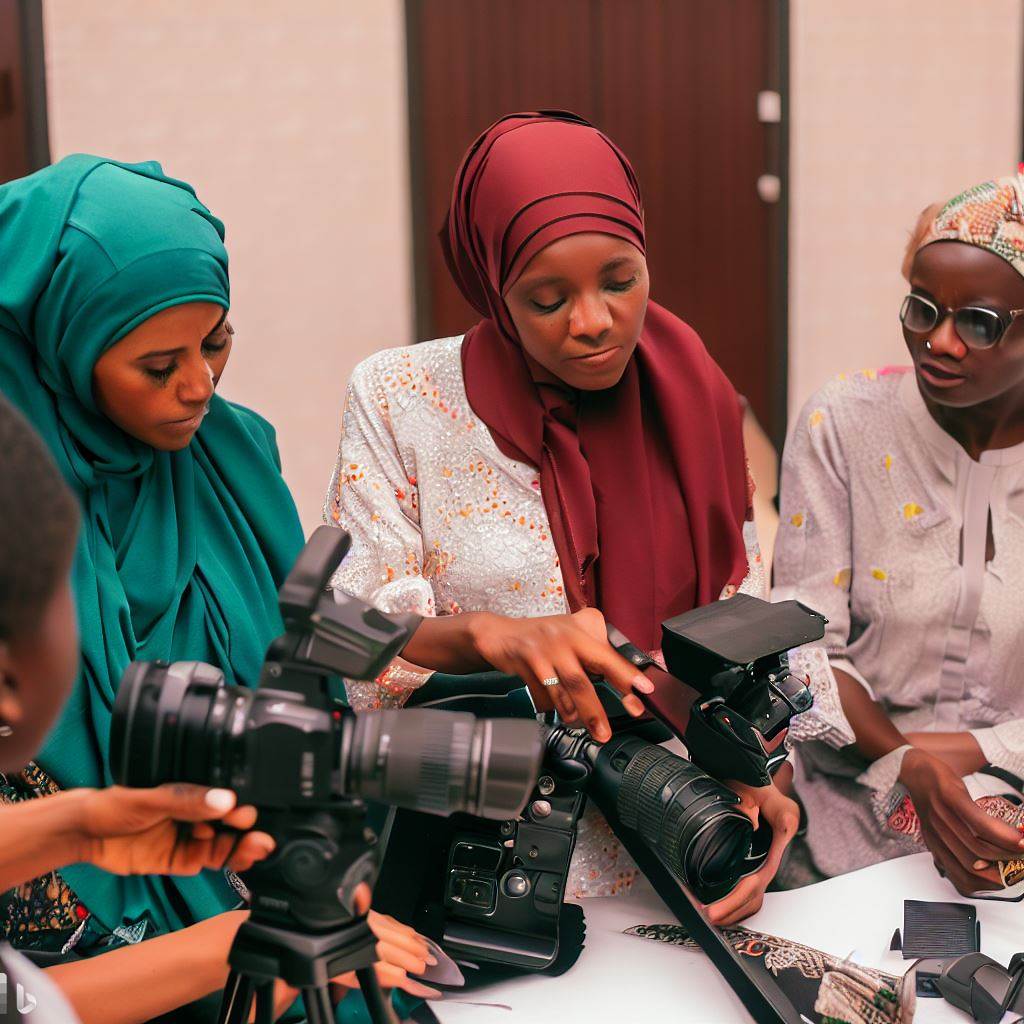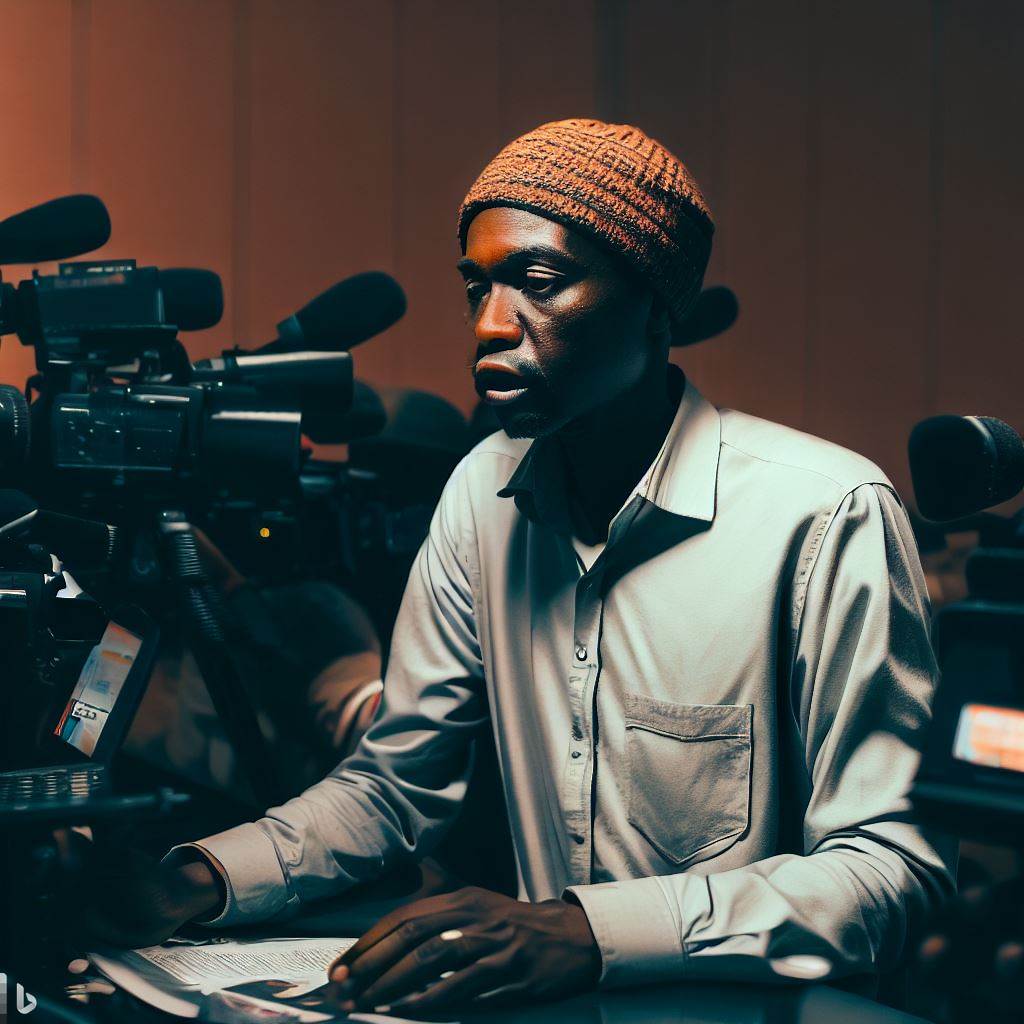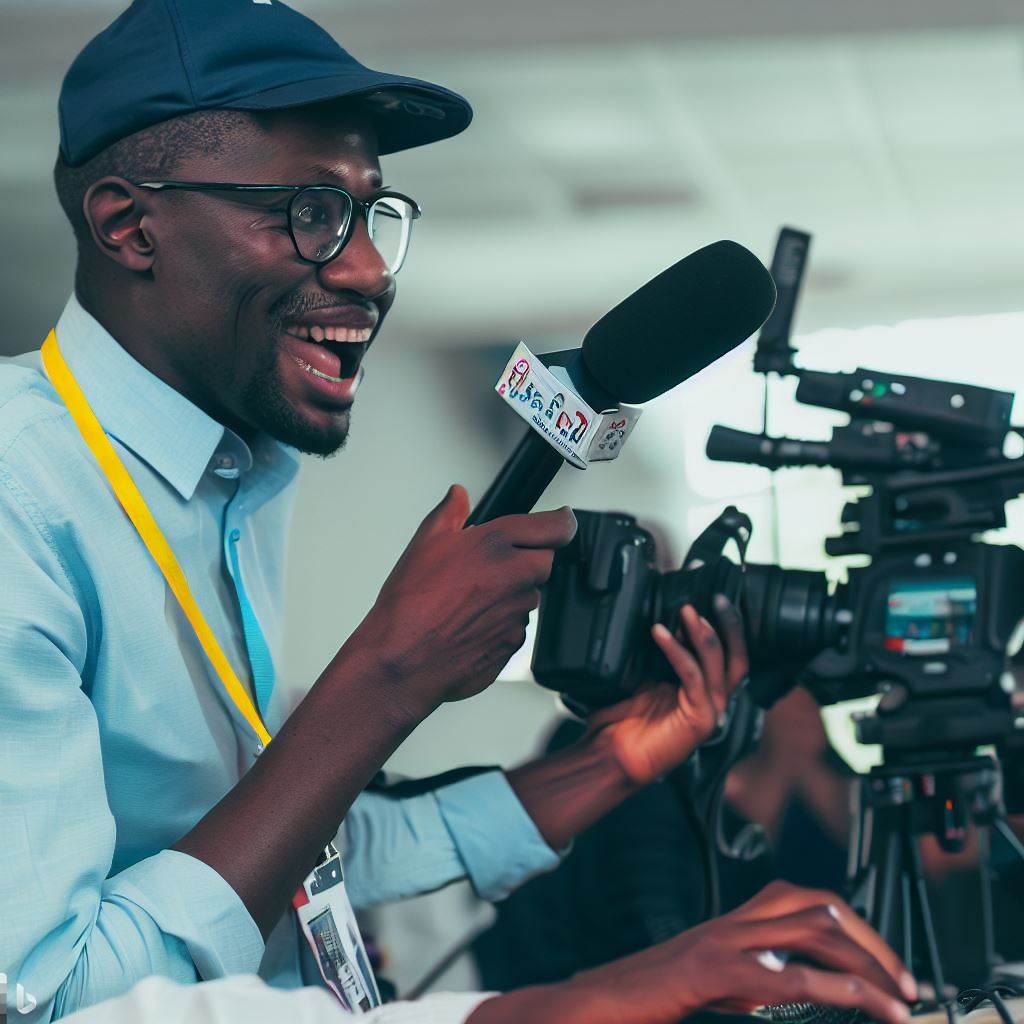Introduction
Women journalists in Nigeria play a crucial role in shaping the country’s media landscape. They bring a unique perspective and amplify women’s voices in various sectors.
However, the current status of women journalists in Nigeria faces challenges and disparities that hinder their full participation and impact.
Despite progress, Nigeria still grapples with gender inequality in the journalism industry.
Women journalists face barriers such as limited access to resources, discriminatory practices, and fewer leadership opportunities.
This hampers their ability to report on critical issues and contribute effectively to the public discourse.
The importance of women journalists in Nigeria cannot be overstated. Their presence brings fresh insights and stories that are often marginalized or overlooked.
Women journalists illuminate gender-based violence, empowerment, healthcare, and education’s impact on Nigerian women. Despite progress, more empowerment is vital.
Equal newsroom roles, opportunities, and tackling bias are crucial for inclusive media.
This section delves into Nigerian women journalists’ status, contributions, and challenges. Recognizing their value and overcoming obstacles can create an equitable, dynamic media environment.
Historical Background
Recognizing Nigerian women journalists’ modern impact requires grasping their historical struggles and milestones towards field equality.
Challenges Faced by Women Journalists in Nigeria
- Limited Access: Women journalists struggled to gain access to education and job opportunities in the early days.
- Gender Bias: They faced deep-seated gender bias, with many considering journalism a male-dominated profession.
- Stereotypes and Discrimination: Women journalists encountered societal stereotypes and discrimination, making their voices and perspectives undervalued.
- Lack of Representation: Newsrooms often lacked gender diversity, hindering the growth and influence of women journalists.
- Harassment and Intimidation: Women journalists frequently experienced sexual harassment, threats, and intimidation in the pursuit of their stories.
Despite these challenges, brave women in Nigeria’s history have paved the way for a more inclusive and diverse journalism industry. Let’s explore some of the important milestones achieved.
Milestones for Women Journalists in Nigeria
- Flora Shaw: Flora Shaw, a British journalist, played an influential role in shaping Nigeria’s narrative during the colonial era. Her reports enlightened audiences on Nigerian affairs.
- Olufunmilayo Ransome-Kuti: A pioneering Nigerian journalist who became an advocate for women’s rights, Ransome-Kuti founded the Abeokuta Women’s Union and was a staunch campaigner for gender equality.
- First Women Newspapers: In the 1930s, women journalists launched their newspapers, such as the “Ladies’ Mirror” and “Everywoman’s Journal,” providing platforms for female voices amidst societal resistance.
- Women’s Liberation Movement: Women journalists actively participated in the Women’s Liberation Movement during the 1970s, championing equality and challenging patriarchal norms in society.
- Forming Professional Associations: In the 1980s, women journalists established professional associations like the Nigerian Association of Women Journalists (NAWOJ) to advance their interests and address gender disparities.
- Award-Winning Journalists: Women journalists in Nigeria have received numerous accolades for their outstanding contributions, setting benchmarks for excellence and paving the way for future generations.
These milestones, among many others, have gradually dismantled barriers and empowered women journalists in Nigeria.
Today, their impact is evident in every aspect of the Nigerian media landscape.
The struggles and achievements of women journalists throughout Nigerian history underscore the importance of gender equality in the field.
Acknowledging past obstacles clears the path for women journalists to persistently contribute and enrich an inclusive media scene.
Prominent Women Journalists in Nigeria
Amma Ogan
A trailblazing investigative journalist known for her groundbreaking exposés.
Ogan’s achievements include uncovering corruption scandals that led to high-level government resignations.
Despite facing threats and intimidation, she remains steadfast in her pursuit of truth and justice.
Ngozi Eze
A fearless war correspondent who has reported from conflict zones all over the world.
Eze’s impact can be seen in her ability to bring the harsh realities of war to the forefront of public consciousness.
Her work has raised awareness and prompted action to protect vulnerable communities affected by conflict.
Funmi Iyanda
A renowned talk-show host and documentary filmmaker who tackles important social issues.
Iyanda’s achievements lie in her ability to spark meaningful conversations and inspire positive change.
Through her documentaries, she has shed light on topics such as gender inequality and the impact of colonialism.
Tolu Ogunlesi
A respected journalist and writer who focuses on political and social issues.
Ogunlesi’s impactful reporting has brought attention to critical issues and influenced public discourse.
She has overcome challenges such as censorship and government interference to uncover the truth.
Impact of Women Journalists in Nigeria
Nigerian women journalists drive societal change, impacting policies and public views with their unique stories and investigations.
Here are some notable examples:
Aisha Dahiru-Bauchi
Aisha’s in-depth investigation into child marriage in Northern Nigeria shed light on the practice’s detrimental effects on young girls.
Her work sparked a nationwide conversation and prompted advocacy groups to push for stricter legislation against child marriage.
Funmi Iyanda
Funmi’s groundbreaking documentary on female genital mutilation (FGM) brought attention to the harmful practice and its prevalence in Nigerian communities.
Her film led to increased awareness, community discussions, and ultimately, a government ban on FGM.
Chika Oduah
Chika’s reporting on the plight of internally displaced persons (IDPs) exposed the dire conditions faced by those affected by Boko Haram insurgency.
Her stories sparked outrage and garnered international attention, resulting in increased humanitarian aid and government action.
Ameyo Stella Adadevoh
Dr. Adadevoh, though not a journalist herself, played a crucial role in preventing the spread of Ebola in Nigeria.
As a physician, she defied pressure to discharge a patient and successfully contained the virus. Her brave actions saved countless lives and highlighted the importance of women in healthcare leadership.
Kadaria Ahmed
Kadaria’s bold “The Core” show confronts corruption, extremism, and politics, fostering open discussion and advocating transparency for better governance.
Ruona Meyer
Ruona’s investigation into Niger Delta’s oil pollution revealed local environmental and health risks, prompting global action and corporate accountability.
Mojisola Ogunlana-Nkanga
Mojisola’s reporting on gender-based violence and rape cases in Nigeria has exposed societal issues while also providing support and empowerment for survivors.
Her stories have prompted legal reforms, increased protection for victims, and raised awareness about the need for gender equality.
These women journalists have not only made a difference in Nigeria but also served as powerful role models for aspiring journalists, especially women.
Their stories and investigations have paved the way for societal change, influencing public opinion and shaping policies to create a more inclusive and progressive Nigeria.
Read: The Future of Nigerian Journalism in a Digital Age

Challenges Faced by Women Journalists in Nigeria
In Nigeria, women journalists face numerous challenges that hinder their progress and impede their ability to make a difference in the field.
These challenges range from societal obstacles to discrimination and gender-based violence.
Societal Obstacles
- Widespread patriarchal norms and stereotypes perpetuate the belief that women are suited for domestic roles rather than journalism.
- Traditional expectations of women to prioritize marriage and motherhood often clash with the demanding nature of journalism careers.
- Limited access to education and professional development opportunities hampers women journalists’ ability to acquire necessary skills and knowledge.
- The lack of mentorship and guidance for aspiring women journalists further marginalizes them in the field.
- Gender bias within newsrooms often leads to sidelining women’s voices and reinforcing the dominance of male journalists.
Discrimination and Gender-Based Violence
- Women journalists in Nigeria often face discrimination when it comes to assignments, with many being assigned soft news or ignored altogether for critical reporting roles.
- Verbal abuse and intimidation are prevalent, undermining women journalists’ confidence and creating a hostile work environment.
- Sexual harassment and assault remain significant issues, with female journalists being vulnerable to exploitation by colleagues, sources, or even authorities.
- Online harassment and threats have become increasingly common, with women journalists subjected to cyberbullying and trolling.
- Women journalists reporting on sensitive topics like conflict or corruption are frequently targeted, leading to increased risks to their personal safety.
Inequalities in the Field
- Gender pay gaps persist, with women journalists earning less than their male counterparts for comparable work.
- Unequal representation in leadership positions and decision-making roles limits the influence women journalists have within news organizations.
- Limited visibility and recognition for women journalists’ work hinder their opportunities for career advancement and professional growth.
- Childcare and work-life balance pose significant challenges, as long and irregular working hours in journalism make it difficult for women to balance their family responsibilities.
- Lack of policies and support systems within newsrooms exacerbate the struggles faced by women journalists, leading to burnout and attrition.
Despite these numerous challenges, women journalists in Nigeria remain resilient and dedicated to their profession.
They continue to break barriers and amplify underrepresented voices, combating the discrimination and obstacles they face on a daily basis.
However, addressing these challenges requires collective action and support from news organizations, society, and the Nigerian government.
Efforts must be made to dismantle gender biases, establish safe working environments, and create equal opportunities for women journalists to flourish and make a lasting impact within the field.
Read: Investigative Journalism in Nigeria: A Closer Look
Initiatives and Organizations Supporting Women Journalists in Nigeria
There are several programs, networks, and organizations in Nigeria that are dedicated to empowering and uplifting women journalists.
These initiatives provide invaluable support, resources, and opportunities for female journalists to thrive in their careers and make a difference in society.
Female Reporters Leadership Program (FRLP)
The Female Reporters Leadership Program is a groundbreaking initiative that aims to address the underrepresentation of women in leadership positions in the Nigerian media industry.
Through mentorship, training, and networking opportunities, FRLP empowers female journalists to break barriers and assume influential roles within news organizations.
Success Story: Rita Ibrahim, a participant in FRLP, was able to use the skills and knowledge she gained to start her own media outlet focused on women’s issues, amplifying the voices of marginalized communities.
Women in Media Development Initiative (WIMDI)
WIMDI is an organization that works tirelessly to promote gender equality in media and improve the working conditions of women journalists.
They provide financial support, legal assistance, and advocacy for fair treatment and opportunities for women in the media industry.
Success Story: Through WIMDI, Sarah Adeleke successfully challenged workplace discrimination and obtained equal pay for her work, setting a precedent for other women journalists.
Women in Journalism (WiJ)
WiJ is a network of women journalists in Nigeria that aims to create a supportive and empowering community.
They organize regular workshops, seminars, and networking events, helping women journalists build relationships, gain valuable skills, and stay updated on industry trends.
Success Story: Bolanle Bakare, a member of WiJ, received a fellowship that enabled her to investigate and report on a major corruption scandal, leading to significant reforms in the government.
Female Photojournalists Association of Nigeria (FPAN)
FPAN is an association dedicated to advancing the careers of female photojournalists in Nigeria.
They provide mentorship, skills development, and opportunities for collaboration, enabling female photographers to showcase their unique perspectives and document important stories.
Success Story: Jane Okoro, a member of FPAN, won an international photography award for her powerful documentary series on the impact of climate change on local communities in Nigeria.
Centre for Media Development and Research (CMDR)
CMDR focuses on promoting media excellence and gender equality in Nigeria.
They provide scholarships, training, and research opportunities, aiming to bridge the gender gap in media representation and create a more inclusive and diverse media landscape.
Success Story: Aisha Mohammed, a beneficiary of CMDR’s scholarship program, became an influential investigative journalist, uncovering corruption scandals and advocating for transparency.
These initiatives and organizations are playing a vital role in supporting women journalists in Nigeria.
Their efforts have not only empowered individual women but also led to positive changes within the media industry, promoting gender equality and amplifying diverse voices.
However, there is still much work to be done to ensure equal opportunities and representation for women journalists in Nigeria and beyond.
Read: Top Nigerian News Outlets: A Comparative Study
The Future of Women Journalists in Nigeria
Discuss the emerging opportunities and possibilities for women journalists in the country
Women journalists in Nigeria are poised to play an even more significant role in shaping the nation’s media landscape in the coming years.
As the industry continues to evolve, there are emerging opportunities and possibilities for their growth and development.
Here are some key areas where women journalists can make a difference:
- Politics: With increasing gender representation in politics, women journalists can play a crucial role in reporting on women’s issues, advocating for gender equality, and holding politicians accountable.
- Business and Economy: Nigeria’s growing economy offers ample opportunities for women journalists to cover entrepreneurship, innovations, and economic policies that impact women-owned businesses.
- Technology: As Nigeria becomes more connected, there is a need to bridge the gender gap in technology reporting. Women journalists can contribute by highlighting women’s contributions to the tech industry and promoting digital literacy among women.
- Social Issues: Women journalists can shed light on pressing social issues such as gender-based violence, child marriage, and education inequality. By giving a voice to marginalized women, they can drive positive change.
- Health and Education: Nigeria faces significant challenges in healthcare and education. Women journalists can contribute by reporting on these issues, raising awareness, and advocating for policies that benefit women and children.
Highlight the importance of continued support and recognition for their contributions
While women journalists face various obstacles in their careers, continued support and recognition are essential for their contributions.
Here’s why:
- Representation: Recognizing women journalists’ achievements helps create role models for aspiring journalists and encourages more women to enter the industry.
- Gender Equality: By supporting women journalists, we promote gender equality in the media, ensuring diverse perspectives and inclusive reporting.
- Positive Impact: Women journalists bring unique perspectives and often focus on issues that directly affect women and girls. Their reporting can bring about positive social change and empower marginalized communities.
- Professional Growth: Recognizing and supporting women journalists’ contributions boosts their confidence, encouraging them to take on leadership positions and contributing to their professional growth.
- Organizational Reputation: Organizations that support and recognize women journalists demonstrate their commitment to diversity and inclusivity, enhancing their reputation and attracting talent.
In the end, the future of women journalists in Nigeria holds great promise.
Through their reporting, they can shape public discourse, advocate for social change, and contribute to a more inclusive and equal society.
It is crucial to provide continued support and recognition for their contributions to ensure a vibrant and diverse media landscape in Nigeria.
Read: Journalism Education in Nigeria: What to Expect
Conclusion
Women journalists in Nigeria are making a significant impact by bringing to light important issues and challenging societal norms.
Their voices deserve to be supported and amplified by readers. By doing so, we can help create a more inclusive and diverse media landscape, ultimately leading to a stronger and more equal society.
In the ever-evolving realm of Nigerian journalism, women journalists shine as beacons of change, determination, and impact.
- Empowering Voices: These women amplify diverse narratives, giving voice to the unheard and marginalized.
- Breaking Barriers: Through their tenacity, they challenge gender norms and pave the way for equality in journalism.
- Inspiring Change: Their stories inspire the next generation of women journalists to enter the field with confidence.
- Championing Investigative Journalism: Women journalists contribute to uncovering truths, holding power accountable, and driving social change.
- Resilience Amid Challenges: Despite obstacles, these women persist, showcasing their dedication to truthful reporting and ethical journalism.
- Shaping National Conversations: Through their insightful reporting, they influence discussions on critical issues affecting Nigerian society.
- Diverse Perspectives: Their presence diversifies news coverage, ensuring a more comprehensive representation of the Nigerian experience.
- Agents of Progress: Women journalists are pivotal in shaping the future of media, influencing policy, and fostering societal development.
As they continue to thrive in their roles, women journalists in Nigeria are driving meaningful change, transforming narratives, and standing as role models for aspiring journalists. Their impact reverberates through society, leaving an indelible mark on journalism and inspiring a more inclusive and informed nation.
Let’s stand behind these women journalists and continue to champion their work. Together, we can make a difference.




